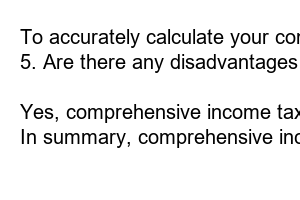종합소득세 대상자
Subject to Comprehensive Income Tax: Understanding Your Obligations and Benefits
Tax season can be a stressful time for many individuals and businesses alike. With numerous tax obligations and complexities to navigate, it can be overwhelming to ensure compliance and take advantage of available benefits. One such aspect of taxation that often raises questions is the concept of being subject to comprehensive income tax. In this blog post, we will delve into the details of comprehensive income tax, its implications, and how it affects you.
Understanding Comprehensive Income Tax
Comprehensive income tax, also known as *CIT*, is a tax regime that takes into account all types of income earned by an individual or entity, ensuring a more inclusive and fair tax system. Unlike other tax systems that focus on specific types of income, such as only wages or capital gains, comprehensive income tax incorporates all sources of income, including employment income, investments, rental properties, and more.
How Does Comprehensive Income Tax Work?
Under comprehensive income tax, individuals and businesses must report all of their income earned within a given tax year, regardless of its source. This income is then subjected to a specific tax rate determined by the relevant tax authority, considering various factors such as income brackets, deductions, and credits. This ensures a more equitable distribution of the tax burden, as those with higher incomes are taxed at a higher rate, while those with lower incomes may benefit from deductions or exemptions.
Benefits of Subjecting to Comprehensive Income Tax
Subjecting individuals and businesses to comprehensive income tax offers several benefits. Firstly, it eliminates any bias towards a specific type of income, ensuring a level playing field for taxpayers. Additionally, comprehensive income tax allows for a more accurate reflection of an individual or entity’s actual financial position, as it captures income from all sources. This can help prevent tax evasion and promote transparency in the tax system. Lastly, comprehensive income tax can facilitate a more balanced and progressive taxation system, as individuals with higher incomes contribute more to public services and social programs.
Frequently Asked Questions about Comprehensive Income Tax
1. Why should I report all types of income?
Reporting all types of income is essential to ensure compliance with tax laws. By accurately reporting your income, you can avoid penalties and legal consequences.
2. Is my income tax rate higher under comprehensive income tax?
Your tax rate may vary depending on your income bracket and other factors. Comprehensive income tax aims to create a more equitable tax system, where higher-income individuals are taxed at a higher rate.
3. Can I claim deductions under comprehensive income tax?
Yes, comprehensive income tax allows for deductions, exemptions, and credits. These are typically based on specific criteria outlined by the tax authority.
4. How can I accurately calculate my comprehensive income tax liability?
To accurately calculate your comprehensive income tax liability, consider consulting a tax professional or using online tax calculators provided by the tax authority.
5. Are there any disadvantages to comprehensive income tax?
While comprehensive income tax aims to be fair and inclusive, it can be more complex to navigate due to the inclusion of various income sources. Seeking professional advice can help you better understand your obligations and maximize available benefits.
6. Can comprehensive income tax help in reducing tax evasion?
Yes, comprehensive income tax can be an effective tool in reducing tax evasion. By requiring individuals and businesses to report all types of income, it becomes more difficult to hide or underreport earnings.
In summary, comprehensive income tax ensures a fairer and more transparent taxation system by incorporating all types of income into the tax regime. By subjecting individuals and businesses to comprehensive income tax, it allows for a more accurate reflection of financial position, a more balanced tax burden, and promotes compliance with tax laws. However, it is essential to familiarize yourself with the specific tax laws and seek professional guidance to ensure accurate reporting and optimization of available benefits.

